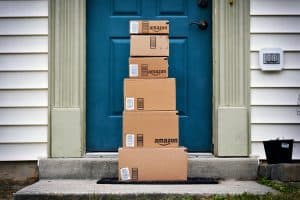Rise of deliveries still proving to be hurdle for apartment buildings, developers

Americans are ordering more goods than ever before. Food-delivery apps like GrubHub and Munchery are on the rise among millennials. And as e-commerce continues to spike, so does the number of packages left at the front door of apartment buildings.
“It’s a problem that’s gotten larger and larger, and I don’t see it getting any smaller,” said Diana Pittro, executive vice president of RMK Management, which manages 31 properties in the Chicagoland area.
Management services and developers are still looking for the perfect solution to the spike in deliveries, an issue that has plagued the industry for the better part of five years. But after a record-breaking holiday season for Amazon, industry experts anticipate that e-commerce is only going to continue to rise – meaning more deliveries than ever before.
As a result, storage spaces are bigger, refrigerated rooms are growing in popularity and lockers have become commonplace among many new apartment developments.
Package flows have tripled over the last five years, according to Pittro, a 20-year industry veteran. But trying to get ahead of the rise in deliveries has been somewhat elusive for RMK Management.
In 2010, after opening a 300-unit building in Chicago, the firm quickly discovered thereafter the storage area was too small. So, three years later, the storage area’s size was doubled in a newly constructed building. Today, the larger storage area commonly nears capacity, marking a demand for more storage space.
Space has proven to be the most pressing issue for RMK. In older buildings, the company has been forced to retrofit already limited space for storage. At K2 Apartments, a Fifield-developed property, packages commonly “oozed over” into the first-floor bathroom during the holiday season, said Randy Fifield, chairwoman of Fifield Realty Co.
But in an age where some deliveries necessitate refrigeration or are the size of a mattress, Pittro says at some point, it will stop, because there simply won’t be any more space.
“There has to be a line in the sand,” Pittro said.
E-commerce hasn’t shut down shopping in brick-and-mortar stores, not yet, at least. While 64 percent of Americans said they prefer shopping in-store versus online (with all things being equal), nearly 80 percent of Americans are shopping online, according to Pew Research Center, in a December report.
Meanwhile, Amazon alone shipped more than 1 billion items through its Amazon Prime and Fulfillment by Amazon services during the 2016 holiday season, the e-commerce giant said Dec. 27. It was the company’s “best-ever” holiday season.
Other apartment companies are hoping to avoid having the items brought into the building in the first place. With the creation of applications like Doorman, companies like Kass Management Services have provided tenants with low-rate memberships where they can schedule their deliveries into a one-to-two-hour slot with the company. Until the delivery, the package is stored at a separate location.
“It’s all about the user experience,” said Mark Durakovic, principal of Kass Management. “You want as many services and amenities as you can. That’s what people are looking for and that’s what we’re looking to deliver.”
At Hubbard Place, located at 360 W. Hubbard St., in Chicago, and owned by The Habitat Company, lockers have proven to be the perfect parcel system. Installed in 2013, the lockers were among some of the first in the Chicago area in anticipation of the expected growth in deliveries, according to Kristin Appel, property manager of Hubbard Place.
Yet, as the surge has continued, Appel said she’d prefer if they could install more. For the 450 residents in the building, there are 60 lockers, Appel said. If a resident is notified via a secure system that they have a package they can go to the locker wall, enter a four-digit code and the locker with their package will open.
Appel said it’d be “life changing” to have more lockers, but said she understands that space is limited, particularly in the city.
For Fifield, the cost of ensuring there’s an efficient amount of space at one of its newest properties, Next, located at 347 W. Chestnut St., was about $40,000. But the firm also relies on a variety of other services, including Doorman and Press Box to ensure that their tenants, across their properties, are getting ample storage opportunities for their packages.
Meanwhile, management services and developers have also had to facilitate a growth in perishable packages.
The Hubbard Place allots a space in their back-room fridge or will request permission from a resident to put the item in their apartment, if they can’t pick it up in due time, Appel said.
At RMK Management, the firm has elected to build refrigerator rooms, which Pittro assimilated to a wine cellar, in their newest properties. The rooms are 30 feet by 30 feet, but the added costs of security and access measure might prevent the rooms from being the one-answer solution to the growth in perishables being delivered, for some firms.
“There’s not one right answer and it’s ongoing,” Fifield said. “People will continue to shop this way, they like shopping online.”
Source: rejournals.com















 Accessibility
Accessibility